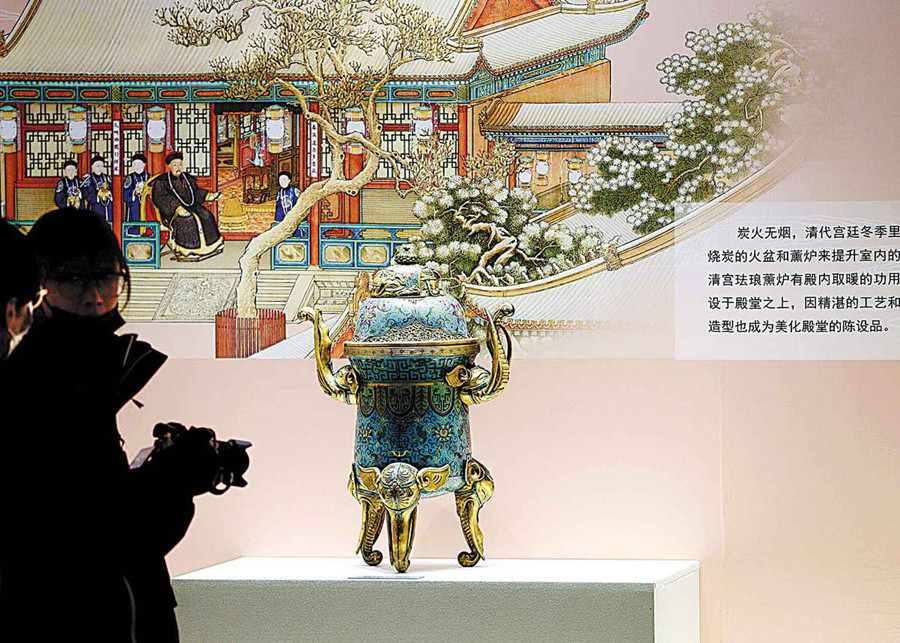CPPCC member to promote museums' talent supply

People visit an exhibition in Shenyang, Liaoning province, on Tuesday that show how people dealt with the cold during winters in the Qing Dynasty (1644-1911). The exhibition shows their solutions in house building, indoor furnishings and clothes, which were designed to resist the severe cold. [Photo/China Daily]
When Nankai University in Tianjin set up China's first museum studies major in 1980, An Laishun, now a member of the 13th National Committee of the Chinese People's Political Consultative Conference, was among the first students.
An's academic background led him to a 40-year career in Chinese museums and international museum organizations, promoting international collaboration and exchanges, including his current work as vice-president of the International Council of Museums and the Chinese Museums Association.
He said that while he has witnessed the achievements made by Chinese museums during the past four decades, he now feels a pressing need to build a sustainable education system in order to maintain the talent supply for the museums.
"I really would like to share my knowledge, my experience and my personal reflections working within the museum sector with more young people, so that they could learn about museums, like museums and consider museums for a future career. And the best place to achieve this is universities," An said.
At the end of 2019, he started working as a professor at Shanghai University. Apart from teaching, he helped to bring about the establishment of the International Council of Museums' International Research and Exchange Center at Shanghai University in December 2020.
The center focuses on establishing a think tank and international network to deal with the crucial issues faced by the international museum community, promoting international collaboration on research of these issues, and the release of data and research reports.
Starting in 2010, one of the subjects the center has been working on is following up on government funding of museums in different countries, to compile a report that sheds light on problems and favorable experiences of financial policies regarding museums, especially amid the impact of the COVID-19 pandemic.
Since the pandemic's outbreak, the International Council of Museums has been conducting surveys every six months on the impact of COVID-19 on museums and museum professionals, and it has published three survey reports.
According to the latest update in July last year, despite some recovery, the overall situation for museums worldwide since 2021 is still not very promising.
While the proportion of museums facing permanent closure has fallen to 4.1 percent, the percentage of survey respondents saying that employees have been laid off rose from 5.8 percent to 9.6 percent within a year, according to the July report.
To tackle the pandemic's ongoing impacts, cooperation should be enhanced on issues of common concern, such as the application of digital technology in museums, sustainable development of the facilities, fighting the illicit trafficking of cultural heritage, and museum leadership and capacity building, An said.
Channels for cooperation include constructive interactions among governments, international cooperation within the framework of the Belt and Road Initiative, working closely with international organizations such as UNESCO and the International Council of Museums, and exhibition exchanges and conservation collaboration among museums, he added.
"Museums all over the world share the same mission-to serve society and social development-and have the same professional responsibilities to protect, research and communicate the truth, goodness and beauty of human beings," An said.
As a member of the CPPCC National Committee, for the past four years, An has attended national or local CPPCC meetings, exchanged opinions on economic and social issues, participated in field observations on topics related to cultural heritage and museums, and submitted proposals, including last year's proposal on upgrading museum services for the elderly and disabled.
For this year's two sessions, the annual gatherings of the CPPCC and the National People's Congress, An said he will continue to address the systems and mechanisms for cultivating young museum professionals, especially regarding museum studies curriculums at Chinese universities.
He has also worked to address sustainability, providing previous proposals on green museum buildings and environmentally friendly operations. This year, he will put more emphasis on how museums can play a role in relation to the United Nations' Sustainable Development Goals, he said.
Copyright © The National Committee of the Chinese People's Political Consultative Conference.
All rights reserved. Presented by China Daily.
京ICP备08100501号-1

